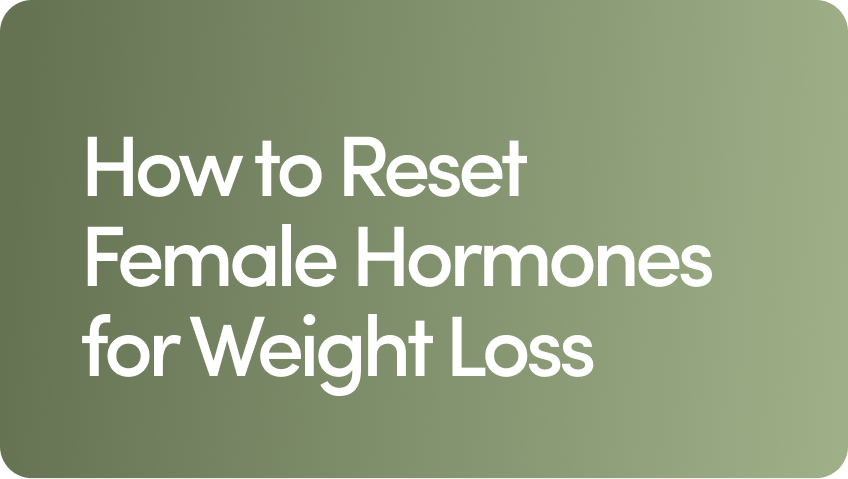Have you ever wondered why losing weight feels so hard, no matter how much you exercise or watch what you eat? The answer might not be just about calories or workouts.
Your hormones play a huge role in how your body burns fat and stores energy. Understanding how hormones influence weight loss can give you the key to finally unlocking your body’s full potential. Keep reading to discover the surprising ways your hormones impact your weight and what you can do to work with them, not against them.

Role Of Hormones In Metabolism
Hormones are chemicals that control many body functions. They play a big role in metabolism, which is how your body uses energy.
Metabolism affects how fast you burn calories and lose weight. Hormones help speed up or slow down this process.
Hormones That Boost Metabolic Rate
Some hormones raise your metabolic rate, helping you burn more calories. These hormones keep your body active and energized.
Thyroid hormones, adrenaline, and growth hormone are key players. They increase how fast your cells use energy.
- Thyroid Hormones:Control how fast your body uses energy.
- Adrenaline:Triggers the “fight or flight” response, raising metabolism.
- Growth Hormone:Helps build muscle and burn fat.
Hormonal Impact On Fat Storage
Hormones also decide if your body stores fat or burns it for energy. Some hormones make your body hold on to fat.
Insulin and cortisol are examples. High insulin levels can cause your body to store fat more easily. Cortisol, a stress hormone, can increase fat around your belly.
- Insulin:Helps store sugar as fat when in excess.
- Cortisol:Raises fat storage, especially in the stomach area.
- Leptin:Sends signals to reduce hunger and fat storage.
Key Hormones Affecting Appetite
Hormones play a big role in controlling hunger and weight loss. They send signals to your brain about when to eat and when to stop.
Understanding these hormones helps explain why it can be hard to lose weight sometimes.
Leptin And Hunger Signals
Leptin is a hormone made by fat cells. It tells your brain that you have enough energy stored.
When leptin levels are high, you feel less hungry. Low leptin makes you want to eat more.
- Leptin helps reduce appetite
- It controls energy balance
- Leptin resistance can cause overeating
Ghrelin’s Role In Food Cravings
Ghrelin is called the “hunger hormone.” It is made in the stomach and tells your brain it is time to eat.
Higher ghrelin levels increase food cravings and make you feel hungry even if you just ate.
- Ghrelin spikes before meals
- It stimulates appetite strongly
- Lowering ghrelin can reduce hunger
Hormonal Imbalances And Weight Gain
Hormones play a big role in how the body gains or loses weight. When hormones are out of balance, it can lead to weight gain. Understanding these changes helps manage weight better.
Two common hormone issues linked to weight gain are thyroid dysfunction and insulin resistance. Both affect how the body stores and uses fat.
Thyroid Dysfunction Effects
The thyroid gland controls metabolism by releasing hormones. If it works too slowly, metabolism drops. This can cause weight gain even with normal eating.
Low thyroid hormone levels make the body burn fewer calories. It also causes tiredness and slower digestion, which add to weight problems.
- Slower metabolism reduces calorie burning
- Fat stores increase more easily
- Low energy limits physical activity
- Digestive slowdown causes bloating and weight gain
Insulin Resistance And Fat Accumulation
Insulin helps control blood sugar and fat storage. When the body resists insulin, sugar stays high in the blood. This causes more fat to build up.
Insulin resistance leads to weight gain, especially around the belly. It also raises the risk of diabetes and other health problems.
- High insulin levels promote fat storage
- Fat collects mainly in the abdominal area
- Body struggles to use sugar for energy
- Increased hunger can cause overeating

Stress Hormones And Weight
Hormones affect many parts of the body, including weight. Stress hormones play a big role in this process. They can change how the body stores fat and burns calories.
Understanding stress hormones helps us see why some people gain weight when stressed. Managing these hormones can support better weight control.
Cortisol’s Influence On Fat Distribution
Cortisol is a hormone released during stress. It helps the body respond to danger by increasing energy. But too much cortisol can cause problems.
High cortisol levels lead to fat storage around the belly. This type of fat is harder to lose and may cause health issues.
- Cortisol increases appetite and cravings for sugar
- It promotes fat storage in the abdominal area
- High cortisol can reduce muscle mass
- It slows down metabolism, making weight loss harder
Managing Stress For Better Weight Control
Lowering stress helps control cortisol levels. This supports healthier weight and fat distribution. Simple habits can reduce stress every day.
Regular exercise, deep breathing, and good sleep improve stress response. Eating balanced meals also helps keep hormones stable.
- Practice relaxation techniques like meditation
- Exercise at least 30 minutes daily
- Get 7-8 hours of sleep each night
- Eat foods rich in protein and fiber
- Limit caffeine and sugar intake
Hormones During Different Life Stages
Hormones play a big role in how our bodies change at different ages. They affect weight gain and weight loss in many ways.
Understanding hormone changes can help explain why weight shifts happen during life stages like puberty and menopause.
Hormonal Changes In Menopause
During menopause, estrogen levels drop. This change can slow metabolism and make it easier to gain weight.
Lower estrogen can also cause fat to gather around the belly area instead of the hips and thighs.
- Reduced metabolism leads to slower calorie burning
- More fat stored in the abdomen
- Changes in appetite and energy levels
Weight Fluctuations In Puberty
Puberty causes many hormone changes that affect weight. Boys and girls both experience growth spurts and shifts in body fat.
Hormones like testosterone and estrogen increase, which changes muscle and fat distribution in the body.
- Increased growth hormone helps growth spurts
- Estrogen raises body fat in girls
- Testosterone builds muscle in boys
- Appetite may increase during growth phases
Strategies To Balance Hormones For Weight Loss
Hormones play a big role in controlling weight. They affect hunger, metabolism, and fat storage. Balancing hormones can help with weight loss.
Using the right strategies can support hormone health. These include diet, exercise, and sleep habits. Each helps your body work better.
Dietary Approaches
Eating balanced meals helps regulate hormones that control hunger and fat. Focus on whole foods like vegetables, fruits, and lean proteins.
Limit sugar and processed foods. They can cause insulin spikes, which may lead to fat storage and weight gain.
- Choose fiber-rich foods to improve digestion and hormone balance
- Include healthy fats like avocados and nuts for hormone production
- Avoid excessive caffeine and alcohol, which disrupt hormone levels
Exercise And Hormonal Health
Physical activity helps balance hormones like insulin and cortisol. It also boosts metabolism and fat burning.
Both cardio and strength training support hormone health. Exercise reduces stress hormones and increases muscle-building hormones.
- Try at least 30 minutes of exercise most days
- Include strength training to build muscle and improve metabolism
- Practice yoga or stretching to lower stress hormone levels
Sleep And Hormone Regulation
Good sleep helps balance hormones like leptin and ghrelin. These control hunger and fullness signals.
Poor sleep raises cortisol, which can cause weight gain. Aim for 7 to 9 hours of quality sleep each night.
- Create a calm bedtime routine
- Keep a consistent sleep schedule
- Limit screen time before bed

Frequently Asked Questions
How Do Hormones Affect Weight Loss?
Hormones regulate metabolism, appetite, and fat storage, directly impacting weight loss. Imbalanced hormones can slow metabolism and increase hunger, making weight loss harder.
Which Hormones Slow Down Weight Loss?
Insulin, cortisol, and thyroid hormones can slow weight loss. High insulin and cortisol levels promote fat storage, while low thyroid function reduces metabolism.
Can Hormonal Imbalance Cause Weight Gain?
Yes, hormonal imbalances like hypothyroidism or high cortisol often lead to weight gain by slowing metabolism and increasing fat storage.
How Can I Balance Hormones For Better Weight Loss?
Balanced nutrition, regular exercise, stress management, and enough sleep help regulate hormones. Consult a healthcare provider for personalized hormone treatments if needed.
Conclusion
Hormones play a vital role in weight loss. They impact hunger, metabolism, and energy levels. Balancing hormones can aid in shedding extra pounds. Stress, sleep, and diet all affect hormone levels. Understanding this link helps in creating effective weight loss strategies.
Exercise and healthy eating support hormonal balance. Consistency in lifestyle changes is key. Small steps can lead to significant progress. Awareness of hormonal influence empowers better choices. Each step matters on this journey. Keep informed and stay committed. Progress takes time but is achievable.
Stay positive and focused. Your health is worth the effort.



